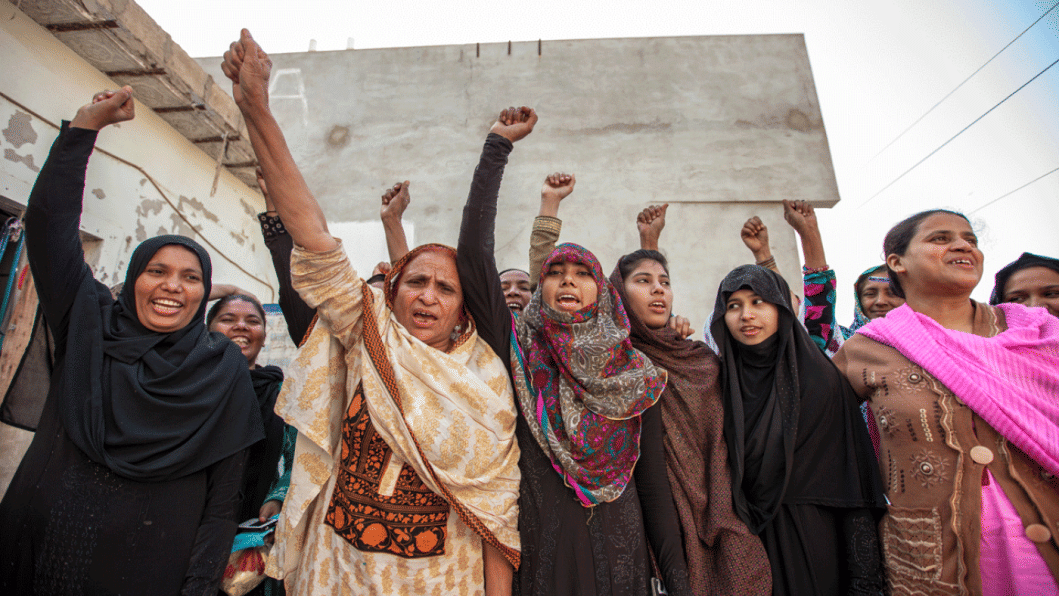Valuing women’s work and activism

Women work hard. All day long, they are busy caring for others, creating new knowledge and ideas, solving problems, building our world, and contributing to our economies and societies in endless ways.
Yet so much of this labour is undervalued and poorly paid. Think of the millions of domestic workers putting in long hours without job security, garment workers in exploitative sweatshops, sex workers whose work is criminalised, and informal sector workers whose work is invisible and unregulated. Patriarchal norms that devalue both women and their labour mean that the work women do, work that is necessary for our survival, is often not even seen as 'real' work.
The devaluing of women's labour is compounded by other economic injustices: in too many communities around the world, women are denied the right to inherit money or property, or to own land, amounting to a systematic transfer of assets from women to men, generation after generation. Women are also denied access to credit, to bank accounts and to financial and other literacies that would enable them to understand and make use of current economic systems. Meanwhile, the communal land and natural resources that rural and Indigenous women depend on for their livelihoods and to which they are entitled are being stolen by private corporations and complicit governments.
The cumulative effect of these injustices is that women are denied access to the power and resources— like money and property, but also information about how economic and financial systems work—that make a dignified, self-determined life possible.
At Mama Cash, we know that feminist activists who are taking on systemic injustices face formidable challenges. Changing deeply-rooted social norms that devalue domestic and care work, challenging factory owners that harass and fire worker activists, standing up to corporations that hire private militias to protect their interests – this is dangerous, sometimes deadly, work.
In March 2016, feminist and environmental activist, Berta Cáceres, was murdered in Honduras. Cáceres had spent years organising her indigenous Lenca community to defend their ancestral lands against local and transnational corporations operating to exploit their territories. Cáceres was murdered because her organisation, COPINH, had been effective in stalling the construction of the Agua Zarca mega-dam.
Indeed, women are organising worldwide, demanding their rights and not backing down in the face of repression. At Mama Cash, we support economic justice for women by putting resources directly into the hands of activists. Where others devalue them and their labour, we champion them. We do this because we know their hard work is paying off.
Since 1983, Mama Cash has provided funding and capacity support to self-led feminist groups that are organising to secure their human rights. Over thirty years of resourcing this work has taught us that feminist activism works and that collective action is the key.
In Pakistan's Sindh province, the Home Based Women Workers Federation (HBWWF), a Mama Cash grantee-partner, has fought for years to secure home-based workers' labour rights. Almost 80 percent of an estimated 12 million Pakistani home-based workers are women; these 'invisible' workers often spend ten hours a day making garments, bangles and other accessories at home. In December 2016, through HBWWF's work, home-based workers won their fight to receive legal recognition as workers. They can now register to access benefits, a victory in itself, and one that sets the stage for putting home-based workers' rights on agendas in other parts of Pakistan.
Women and Land in Zimbabwe (WLZ), another Mama Cash grantee-partner, is a women's organisation that addresses unequal control over land and natural resources. Nearly 80 percent of Zimbabwe's population is rural, with women cultivating an estimated 60-80 percent of agricultural output. WLZ supports women to lobby traditional leaders and local authorities to ensure equitable access to land. In recent years, WLZ has grown dramatically, from 2,000 to approximately 10,000 members, increasing women's awareness of their land rights and the number of women owning and controlling land.
Victories and advances like these inspire me, and I never tire of hearing about them. Indeed, they drive me to do my work at Mama Cash, helping us to play our role in bigger social change processes, including achieving economic justice for all. Our special role is to mobilise and move resources towards the visionary feminist activists and movements around the world that every day, with creativity and courage, are building a more just future for women—for all of us—worldwide.
https://www.mamacash.org/en/en-homepage

 For all latest news, follow The Daily Star's Google News channel.
For all latest news, follow The Daily Star's Google News channel. 



Comments